For travelers around the world, visiting a tropical beach resort in Thailand feels like a far-off dream right now due to Covid-19 travel restrictions.
The country’s borders remain closed to international tourists and plans for an aviation “bubble” with other nations continue to sputter.
Thailand’s tourism sector, which contributes close to 15% of its GDP according to the World Bank, has been severely impacted.
For the moment, domestic travelers are infusing some much-needed cash into the ailing industry. Thailand hasn’t reported a locally transmitted Covid-19 infection in more than 50 days, giving travelers a sense of security as they hit the road.
Though destinations like Koh Samui and Phuket continue to suffer from the lack of overseas visitors, resort towns within driving distance of Bangkok are taking advantage of locals’ urge to travel following weeks of lockdown.
Among these is the seaside town of Hua Hin.
Located about a 2.5-hour drive from Bangkok, it’s Thailand’s first beach resort, having become a popular retreat for royalty and upper-class families in the early 1900s.
Today, you’ll find a wide mix of accommodation offerings, from guest houses to five-star luxury properties, including many big global brands.
CNN Travel recently visited three different high-end Hua Hin properties – all experiencing high occupancy rates – and spoke with their managers to find out how they’re adapting to Thailand’s post-Covid realities and what guests can expect during a stay.
The family-friendly resort: Anantara Hua Hin
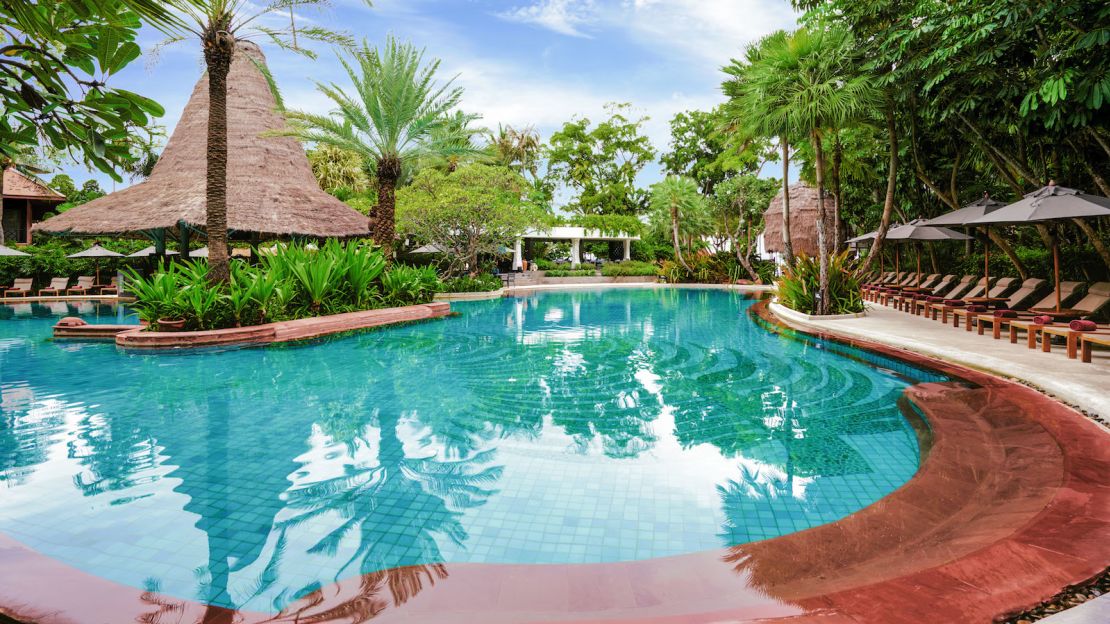
Part of the Minor Hotels group, the beachfront Anantara Hua Hin is known for its family-friendly offerings and is a popular choice for those in search of that traditional Thai resort experience. A sprawling, low-rise property, it was designed to look like a local village with tropical landscaping and lotus-filled lagoons.
Guests can choose from a mix of 190 rooms and suites, some overlooking the lagoons and gardens, others with ocean views.
During a recent weekend visit, the resort was filled with Thai and expat travelers.
“We expected to be busy when we reopened but the demand was beyond our initial forecast and it truly was incredible,” says Anantara Hua Hin general manager Graham Ure.
“We are seeing a lot of last-minute demand for the destination – weekends presently we are running at 100% occupancy.”
Checking in: Before guests enter the lobby, they need to stop at a desk to fill in a form with their contact info and have their temperatures checked. (The pens are taken from one jar, then, after use, are placed in another to be sterilized.)
Cleared to enter, guests then head to the check-in desks in the lobby, where large acrylic glass screens provide a barrier between staff and guests.
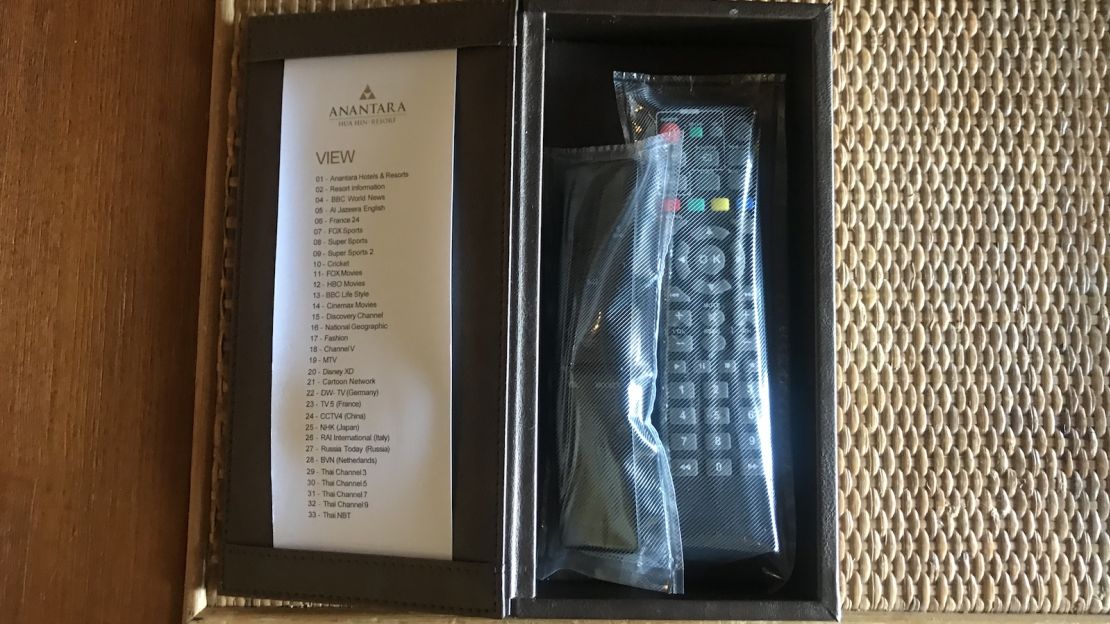
Inside the rooms: You won’t notice it, but some of the décor has been removed to decrease “touch points,” say staff. There’s a UVC ozone disinfection light on each desk, which is turned on prior to each new arrival.
TV/stereo remotes are wrapped in plastic for easier cleaning. Guests are each provided with an amenities kit containing a mask and hand sanitizer.
At the pool: During our visit, families splash in the resort’s main pool, some enjoying happy hour at the swim-up bar.
Deck chairs are in abundance, and drink/food service is available as normal.
The only noticeable change is with towels. Nobody is handing them out poolside. Instead, guests get a set of pool towels in their room to bring with them to the pool/beach, so as to reduce handling and washing.
Mask use: Staff wear masks at all times. Usage is optional for guests, with the exception of the dining areas.
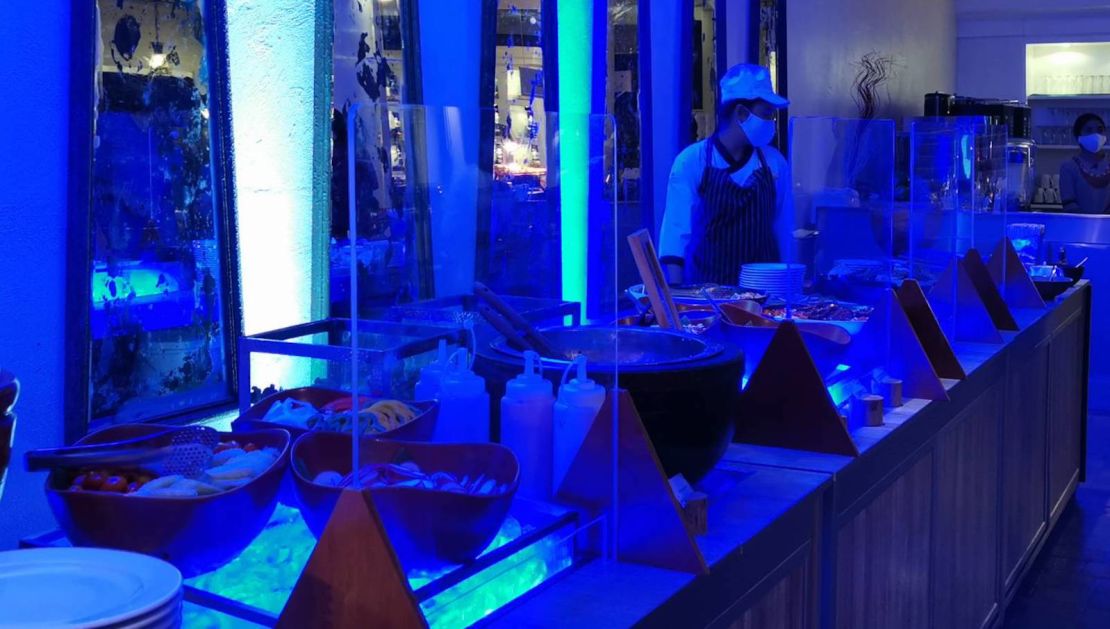
Dining out: Yes, buffet breakfasts and dinners are still happening, but for the most part guests don’t serve themselves.
Food sits behind acrylic glass barriers and masked staff man the stations. Diners are requested to wear masks while collecting food but can remove them when seated.
Another noticeable change: cloth napkins are no longer used. it’s all about the paper now, again to cut down on handling and washing.
Still nervous about dining in large public spaces? Take advantage of Anantara’s “Dining by Design” option. Staff can set up a lovely, tailor-made seaside dinner for your group.
Safety measures: When asked about the biggest changes to operations since reopening in June, general manager Ure points to Anantara’s rigid new “Stay With Peace of Mind” program.
“This program builds on existing health and safety regimens to implement heightened sanitization and hygiene measures,” he says. “At Hua Hin we still want to offer our traditional Thai hospitality and charming service but in a safe environment.”
These guidelines extend to back-of-house operations that guests won’t see, he says, from team member temperature checks and supply chain deliveries to culinary preparation areas.
Anantara Hua Hin, 43/1 Hua Hin 5/2 Alley, Hua Hin, Hua Hin District, Prachuap Khiri Khan 77110; +66 (0)32 520 250
The luxury villa experience: V Villas Hua Hin
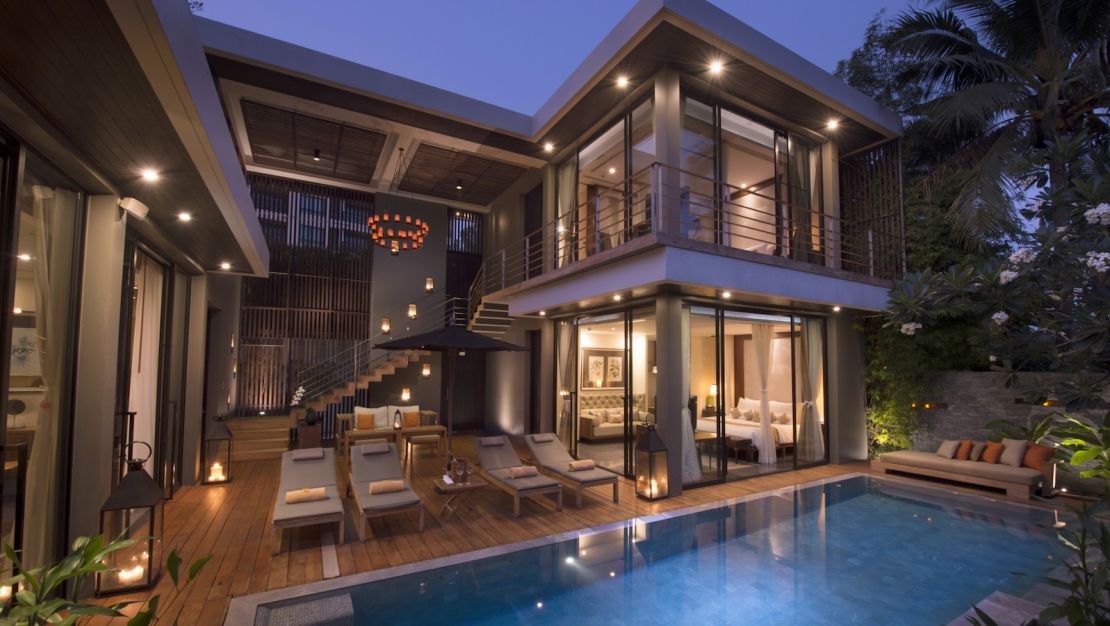
For travelers who want an added level of privacy, a spacious pool villa is definitely the way to go right now.
In Hua Hin, V Villas – part of global hospitality group Accor – is among the leading options thanks to its location close to the town center on one of the nicer stretches of beach.
Made up of one-, two-, and three-bedroom pool villas, V Villas also has its own large beachfront swimming pool and the beautiful Villazzo restaurant, but many of its offerings are designed to be enjoyed in the privacy of your own villa.
According to General Manager Nicolas Peth, they’ve been overwhelmed by interest.
“Hua Hin is booming,” he says. “I love the fact that it’s known again for all the right reasons – it’s a family destination, offering a nice weekend on the beach. We’ve been successful because of what we offer – fabulous service and privacy. We are so busy. Week days, weekends – I’ve never had to say ‘sorry but we’re full’ to so many people. It’s a good problem to have.”
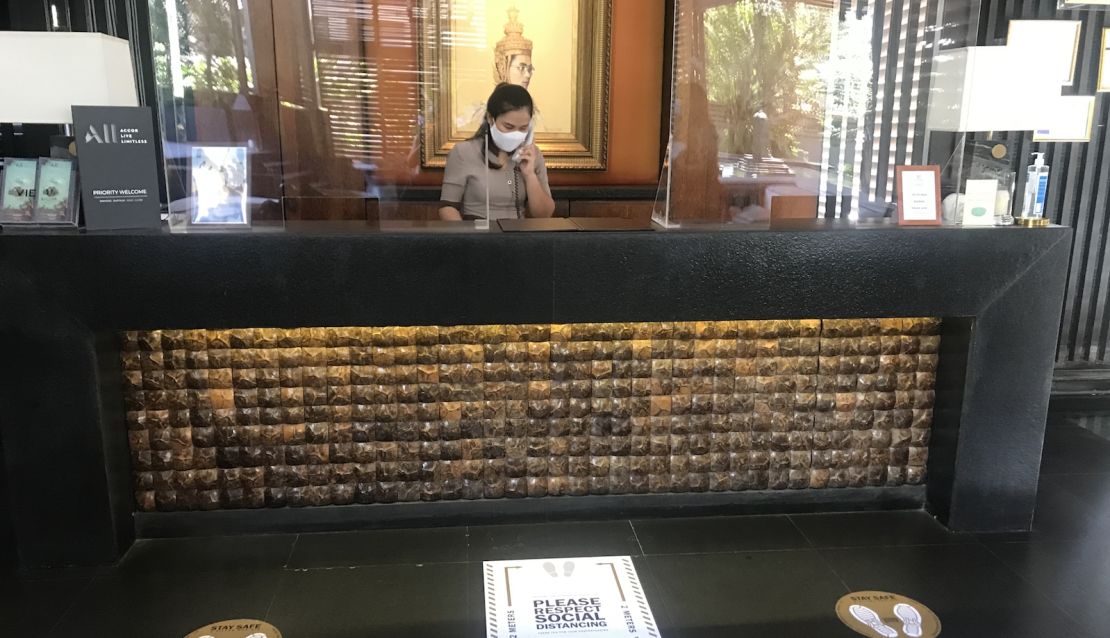
Checking-in: In the resort’s small lobby, acrylic glass dividers have been placed on the counter to separate staff from guests and social distancing markers have been pasted on the floor.
In the rooms: In the pool villas, guests won’t notice too many changes – the increased sanitation measures all take place before you arrive.
Each villa comes with a private butler who is able take care of all requests, from reservations to housekeeping, meaning contact with other staff members is kept to a minimum.
Mask use: Staff wear masks at all times. Guests are requested to wear them while checking in and serving themselves at the breakfast buffet, but it’s fine to keep them off in other areas of the resort, such as by the pool.
Dining: The buffet breakfast lives on here too and there’s also a small menu with Thai and Western offerings.
Some of the items are available for self-serve, though others are at stations manned by masked staff. Tables have been spaced out, with seats two meters apart.
Those wanting to avoid crowds can ask their butler to arrange a number of in-villa dining experiences, such as high tea, a “floating” pool breakfast or a private BBQ.
Around the pool: Loungers are also spaced out but, this being a small resort filled with private pools, the main pool was never used by more than a handful of people at a time during our visit.
Safety measures: V Villas strictly follows Accor’s international ALLSAFE program, which includes enhanced cleaning and disinfection measures.
“ALLSAFE is an upgraded program but we were already very strict before anyway,” notes Peth. “When you’re selling villas at that price it has to be super clean. It’s all about training, safety and taking care of our guests.”
V Villas Hua Hin, 63-39 Petchkasem Rd, Tambon Nong Kae, Hua Hin District, Prachuap Khiri Khan 77110; +66 (0)32 616 039
The boutique experience: Cape Nidhra
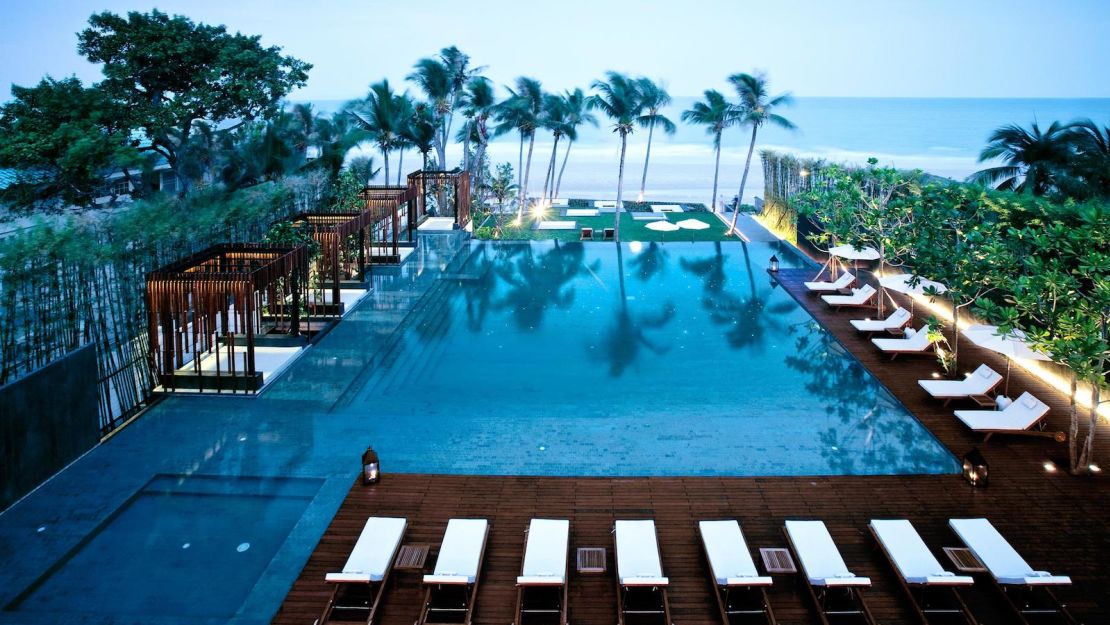
Another property benefiting from its closeness to Bangkok is Cape Nidhra, part of the Thai-owned Cape and Kantary Hotels group.
For travelers who would prefer to avoid large, crowded resorts, this boutique luxury beachfront property in the center of town is an ideal option.
Made up of about 60 suites, all of which come with plunge pools, Cape Nidhra has done a fine job of distinguishing itself from the bigger chains by offering unique touches and exceptional service, alongside a strong commitment to sustainability.
“We don’t have the same level of resources as the global chains so we try to offer something personal and give all our heart,” says owner Tirawan Taechaubol.
Rather than open all suites at once, Tirawan says they eased into things gradually to ensure their new Covid-19 policies could be carefully implemented by staff. Following a soft launch in June they officially reopened on July 1 and have experienced high occupancy rates since.
“Nobody wants to go on the plane right now,” she explains. “Hua Hin has a reputation for offering a nice, clean beach, and the town is what Thais classify as a more upper-class resort than others you can travel to by car. With the prices coming down – everyone is discounting, especially on weekdays – it opens more opportunities for people to be able to afford Hua Hin. So it’s more packed than normal.”
Checking in: There are no plastic dividers on the lobby desk here. Instead, masked staff wear plastic visors. Visitors are asked to place their passports and credit cards on a tray rather than pass them to staff directly. Guests are also given an amenity kit that includes a mask and hand sanitizer.
In the rooms: Guests won’t notice many changes, but there’s plenty going on behind the scenes including additional disinfection measures. Even the remote controls are sprayed, says Tirawan.
Masks: All staff wear masks, some with additional plastic visors. Again, guests are requested to use them in the dining areas but they’re not required around the pool or during spa treatments.
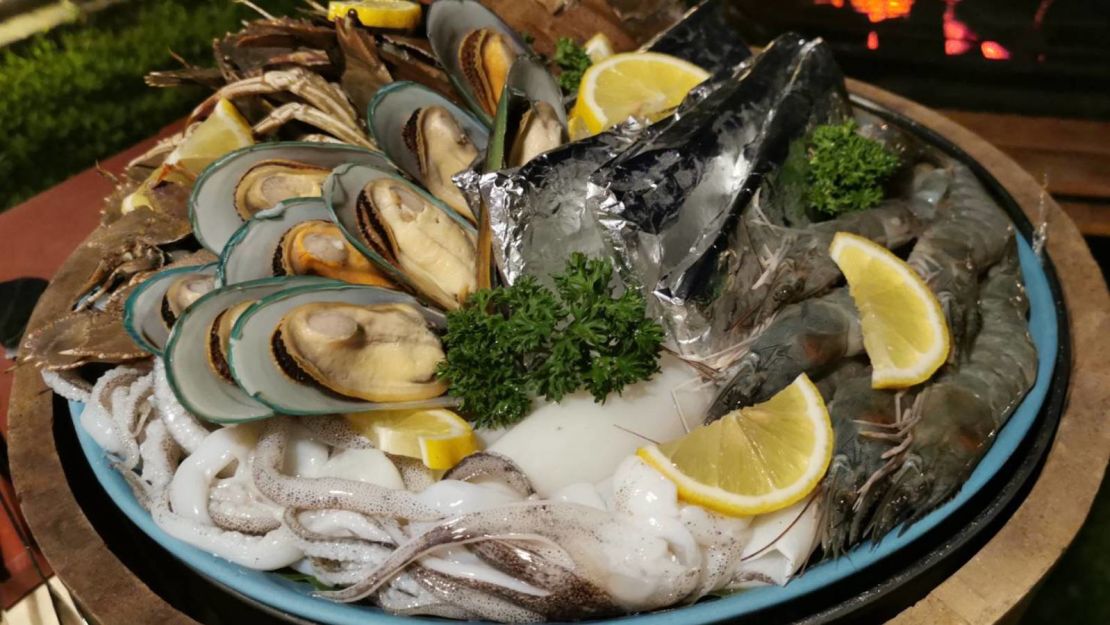
Dining: The resort’s Rocks Restaurant serves a mix of global and local seafood specialties, while upstairs is the stunning On the Rocks bar, which offers views over the Gulf of Thailand. Social distancing measures are in place in both venues, with chairs and tables spaced out.
Guests are asked to use the provided hand sanitizer before being seated.
The breakfast buffet features a variety of self-serve items, some protected by acrylic glass screens, and guests are able to order some dishes through staff as well. Utensils are wrapped in plastic – a necessary evil Tirawan admits she hates – to ensure they’re only touched by one staff member.
Travelers looking for added privacy can arrange a tailor-made beachfront dinner, including buffet style, overseen by a personal chef.
At the pool: Around the resort’s large pool, chairs are spaced out according to Cape Nidhra’s social distancing policy. Pool towels are handed out by staff in cloth laundry bags – guests are asked to pull them out themselves.
Safety measures: “Everything is distanced and disinfected and we’ve minimized the number of people who touch things,” says Tirawan. ” Apart from that I’ve tried to keep it as normal as possible.”
That said, she acknowledges the policies may have to change according to the situation on the ground.
“Right now, our numbers in Thailand have gone down, all people infected are in quarantine,” she says. “When international tourists come back our precautions will likely increase. We can’t afford a second wave.”
Cape Nidhra Hotel, 97/2 Petchkasem Rd, Hua Hin, Hua Hin District, Prachuap Khiri Khan 77110; +66 (0)32 516 600

















